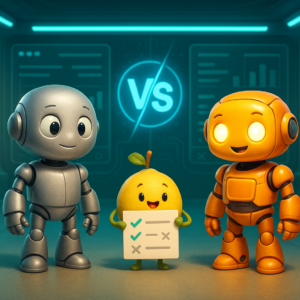A startup can automate its customer support by implementing AI-powered tools to handle inquiries, resolve issues, and provide assistance around the clock, significantly enhancing efficiency and customer satisfaction.
For startups, customer support is a critical function, often stretching limited resources thin. However, the advent of AI offers a powerful solution. AI tools enable founders to create a scalable, always-on support function without needing a massive team. This guide explores how a hypothetical startup, “Innovate Solutions,” used AI to revolutionize its customer support operations.
The Challenge: Scaling Support on a Startup Budget
A rapidly growing SaaS company was experiencing a surge in user sign-ups. While this was a success, it also led to an overwhelming volume of customer support tickets. Their small support team struggled to keep up, leading to:
-
Long response times: Customers often waited 24 hours or more for a reply.
-
Decreased customer satisfaction: Frustrated customers began leaving negative reviews and churning.
-
Team burnout: The support staff was overworked and stressed, impacting morale and retention.
The leadership team recognized that their existing support model was unsustainable and that they needed a scalable solution to maintain customer loyalty and support their growth trajectory.
The Solution: Implementing an AI-Powered Support Agent
The company decided to build and deploy an AI customer support agent using no-code tools. Their strategy focused on leveraging AI for common, repetitive queries, allowing their human agents to focus on complex, high-value interactions.
Step 1: Defining the AI’s Role and Scope
The first step was to identify which types of customer inquiries the AI could effectively handle. After analyzing their ticket data, they found that over 60% of incoming requests related to:
-
Password resets and account access issues.
-
Basic feature explanations and “how-to” questions.
-
Billing inquiries and payment clarifications.
-
Troubleshooting common technical glitches.
They decided to build an AI assistant specifically trained to handle these Tier 1 support requests, ensuring rapid responses and freeing up their human agents.
Step 2: Selecting the Right AI Platform
The company chose LaunchLemonade for its user-friendly interface and powerful customization options. They needed a platform that allowed them to:
-
Easily upload their existing knowledge base (FAQs, documentation, product guides).
-
Craft specific instructions for the AI’s behavior and tone.
-
Test and iterate on the AI’s responses before deployment.
-
Integrate the AI into their existing customer support system.
Modern AI in customer support can provide faster responses, assist across languages, and handle basic ticket triage, all of which are key for startups.
Step 3: Building and Training the AI Assistant
Using LaunchLemonade, the team followed a straightforward process. They began by uploading their comprehensive FAQ section, product documentation, and troubleshooting guides to serve as the AI’s knowledge base.
Next, they crafted detailed instructions. This involved defining the AI’s persona: a friendly, helpful, and efficient support assistant. The instructions included specific guidelines on how to respond to different types of queries, when to escalate to a human agent, and the desired tone of communication.
For example, one of their core instructions was: “You are ‘LemonBot,’ the AI support assistant. Your primary goal is to provide instant, accurate answers to customer inquiries related to account management, feature usage, and common troubleshooting. Always maintain a helpful and positive tone. If a customer’s issue is complex or requires human intervention, kindly direct them to our human support team by providing a link to our contact page.”
They spent time testing LemonBot with simulated customer queries, refining its instructions and knowledge base based on its performance. They ensured it could handle variations in how customers asked questions, a crucial aspect of effective AI deployment.
Step 4: Integrating AI and Human Support
The AI assistant wasn’t designed to replace human agents entirely but to augment their capabilities. The company integrated LemonBot directly into their support ticketing system.
-
When a customer submitted a ticket, LemonBot would immediately attempt to provide an answer from its knowledge base.
-
For queries that LemonBot couldn’t resolve, or if the customer explicitly requested human help, the ticket would be seamlessly escalated to a human support agent, complete with the AI’s interaction log for context.
This hybrid approach allowed the human team to focus on more challenging issues, providing deeper, more personalized support where it was needed most. AI is becoming the backbone of customer service operations, enhancing efficiency without compromising on customer experience.
The Results: A Transformation in Support
Within three months of implementing LemonBot, the company saw remarkable improvements:
-
Response Time Reduction: The average first response time dropped from over 24 hours to under 5 minutes for AI-handled queries.
-
Increased Ticket Resolution Rate: LemonBot successfully resolved over 65% of incoming Tier 1 requests automatically.
-
Improved Customer Satisfaction (CSAT) Scores: CSAT scores increased by 20%, with customers praising the speed and efficiency of the support.
-
Reduced Support Costs: By automating a significant portion of inquiries, the startup reduced its per-ticket support cost by 30%.
-
Empowered Human Agents: The support team could now dedicate more time to complex problem-solving and proactive customer engagement, reporting higher job satisfaction.
Key Takeaways for Startups
The company’s success demonstrates that automating customer support with AI is not only feasible for startups but can be a significant competitive advantage. Key takeaways include:
-
Start Small and Focused: Identify your most frequent and repetitive customer queries and build an AI to handle those first.
-
Leverage No-Code Platforms: Tools like LaunchLemonade make it accessible to build sophisticated AI assistants without deep technical skills.
-
Prioritize Clear Instructions: The quality of your prompts and knowledge base directly determines the AI’s effectiveness.
-
Embrace Hybrid Support: AI and human agents work best together, with AI handling volume and routine tasks, and humans managing complexity and empathy.
-
Measure and Iterate: Continuously monitor performance and refine your AI’s capabilities based on data and customer feedback.
Starting small, iterating, and not being afraid to experiment can lead to significant time savings and improved efficiency.
Ready to Automate Your Support?
Don’t let support challenges hinder your startup’s growth. Discover how easily you can build and deploy an AI-powered support agent that delights your customers and empowers your team.
Book a demo with LaunchLemonade today to see how AI can transform your customer support.





